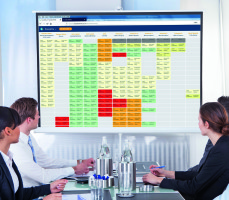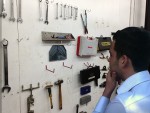60 years of information-at-a-glance!
Published: 27 June, 2023
Phil Heine is celebrating T-Cards Direct’s 60th Anniversary. Developed by his father, the company has played an important role in the engineering sector throughout this period and PWE caught up with Phil to learn a bit more about the concept and history of the company.
Can you explain the T-Cards concept.
PH: T Cards is a very simple idea where you have important details noted on a card that can be moved around a board. The key “identifier” information is visible whilst the card is in the T Board. When the card is taken from the board you can have as much or as little additional information. The card’s location on the board communicates to anyone who looks at that board the status of that task or item. It is “information at a glance”.Can you tell me about the history behind the creation of T-cards, how your father developed it, and how you got involved.
PH: The idea of T Cards originally came from France in the 1950’s. The first system was called Strafoplan, a modular system with 5 different sizes. We still have the patents and the tooling for this system. The system was introduced into the UK in the early 60’s with Peter Williams Business Machines in Erit, Kent being the main supplier in the UK. My Father, who had a small printing company, knew the sales reps of Peter Williams through playing golf. He was asked if he could print on a T Card as it was a difficult and costly thing to do. He found a way of printing both on card and NCR (or duplicate) sets where you could have a copy of a card in more than one T Board.
Over the years he built a successful company, but all the while he was building knowledge of how companies manage their processes. He became a supplier of the T Boards as well as the T Cards and the product became less important to Peter Williams, so they sold the system to him.
First my sister, Sarah became involved with the business, she had been a consultant for the Industrial Trainee Board in the late 80’s and early 90’s and when that was replaced, she came into the business to help Fred. Her experience gave a big boost to the business. A few years later I got involved albeit, rather by accident, although I always felt an affinity with the T Cards product. I grew up with it having helped dad in the workshop from an early age. Dad also went out and installed the systems for some clients, I used to go as his assistant. It was a great experience going to all these different types of companies. In most cases they didn’t realise he was the boss and was just “the fitter” and sometimes receive a tip for his enthusiasm and help in getting them setup. They wouldn’t happen now a days.
What was your father’s background?
PH: Born in 1935, he went to school locally in Addington. Left school when he was 14. He was Conscripted into National Service with the RAF serving in Egypt during the Suez crisis. De-mobbed he trained as a paper maker at the Reeds Papermill in Aylesford Kent. His mother was widowed during the war after his father was killed in an accident whilst on duty as a local policeman. He was checking the local area one night but was killed when a German Bomber dropped its bombs on a local pub which he was “inspecting”. He had previously been a successful businessman and left a plot of land where my Father would later build our factory. Dad soon left Reeds and after working as a salesman for a die stamp stationery company decided to setup his own print business in 1964.
Did you always want to join your father in the business?
PH: No, I intended to have my own career having specialised in Packaging Technology and was working in Germany advising companies on Packaging Legislation – “Der Grune Punkt”. At the time all the exgraduates I spoke to dreamed of having their own company and I thought; well, there is one already waiting there for me to make an impact”. In 1994 my father had fallen ill, whilst my sister Sarah was pregnant with her first child. We all spoke and Sarah said, “if you had ever thought about joining the business soon would be a good; time so, take some time to think it over and let us know in a couple of months”. I did not hesitate to return to the UK and help with the business.
What have been your most memorable moments working at the company?
PH: There have been so many exciting moments, each day is always different. In the beginning I was really pleased with developing the profile and branding of T Cards Direct. For the first 10 years I mainly spent time visiting clients across the whole country. I’ve met some amazing people and seen some interesting companies across the spectrum. This gave me a great understanding of business needs for visual planning in a broad scope of businesses.
What challenges have arisen over the years?
PH: Developing T Cards Online has been a steep learning curve for us a company. I’ve almost re-skilled and learnt a lot about coding and software licencing. It is like print in a lot of ways making sure we put in the checks and balances before releases. When we were at exhibitions everyone said why not have a digital version. We initially thought it would damage the demand for manual systems but in fact the opposite has happened. We now have another string to our bow. It has been a challenge to demonstrate to people just what a flexible and versatile tool it is. Companies always try and make things more complicated than it needs to be and wrap themselves up with processes and analytical tools.
What motivated your father to drive the business forward and would he have been concerned about the move to online?
PH: Fred was “that” generation, he very rarely stopped. He took a lot of joy with making the business grow, setting the foundations for future generations as he saw it. He was very proud that Sarah and I joined the business, although he would never admit it to us. A great advocate of change and improvement he was always trying to make things more efficient and better and took great interest in technology and what it could give us. I think it might have been a little perplexing, but he would have seen the development of an Online system as natural progression. I remember him saying regularly “Don’t make it about the money, it’s not good just to do things for money. We work to live not live to work but take satisfaction of doing a job well done.”
How has the T-cards system changed over the years?
PH: I’ve seen massive change in 25 years. Every company used to have a visual planning system and T Cards were used for everything from pallet racking to keeping track of staff rotas at HM Immigration. Of course, that has mostly gone with some amazing systems out there making things so much more efficient. However, it never ceases to amaze me the new applications T Cards are used for. Clients come to us and say: “I have an issue; can you design a system to do this; but I need it on the wall so all the staff can see and update it without having to log in!”. Also, we see the same issues keep returning, whether it is Health and Safety; Task or Workflow management; or just managing where people are, there are simple, quick, and easy ways to make these better for staff with a manual board. We supply on a monthly basis as many as we ever had.
How does the T-Cards concept work now it has moved online?
PH: T Cards Online has provided some excellent development opportunities. We have made it as intuitive as possible and backed that up with personalised support. The idea of creating your own system like you could with the manual boards is such a convenient way for companies. It has allowed some companies to make a jump to an IT solution in an environment where the skill sets within the business might not have otherwise been suited.
The system is sold as a subscription so there is no initial outlay and being a website requires no resource investment. Just a broadband connection and it can be up and running within minutes. Set the layout of the T Board, define what information you want on the T Cards and set who can see and do. Users can then start managing tasks literally within minutes.
We get a broad spectrum of clients. We attract those that don’t want the huge investment in time and money for a full all-encompassing system. Others don’t want to put all their eggs in one basket and having a separate workflow system means that if one thing is not working staff can continue with their day-to-day. Other companies hanging on for that investment but need something immediately come to us for a quick fix but often end up using us for years! This happens a lot.
In other instances, a client might start using the system as a temporary measure, as they know change in the business is round the corner, like being bought out by another company. However, they’ve continued to use the system in the longer term as it works so well, and the alternative systems are not so flexible or don’t have the visual impact. It’s even been rolled out in reverse with T Cards Online being introduced into the buyout company.
About 30% of the business is now online but this is growing each year. It takes time but we are in this for the long term.
How has the online system changed the business?
PH: The staff makeup has certainly changed. We now have dedicated coders and support staff. Whilst we do have home workers most like to use the office. The main issue is supporting our international clients from Australia, Singapore, UAE , Canada and California. In the early stages this was a little challenging with the time zones but we have processes and cover in place now.
Do you see any limitations in the T-Cards concept in an everchanging manufacturing sector?
PH: If anything, the concept is still to be realised. Most Business Improvement Ideology promotes and advocates visual representation of the status of work or tasks. For many this can be quite daunting, especially when communicating to staff who as we know don’t like change for the sake (as they see it). But it is made simple with T Cards in a format most are familiar with. Creating that feeling of ownership by stakeholders for systems is so much easier with something like T Cards Online as it is still almost tactile. T Cards Online genuinely turns catchy business phrases like into actual benefits.
From a technology perspective, we are developing T Cards Online in a way that future proofs the software. At every opportunity we are updating the code with the latest technology, incorporating API end points so clients can hook themselves into the system. Making a socket so clients can plug their information into the system, if you like.
We also have introduced a Workflow Engine where you can define actions and consequences. A What If function but much more powerful. This is still in its early stages of development but should help companies in the future as they meet more challenges.
What are your hopes for the future of the business?
PH: I can’t see the requirement for the manual systems dying, so I’m confidant of that side of the business. The demand is holding up which is really pleasing.
For T Cards Online I have high hopes. My Nephew is one of the main developers of the site and I’m sure he will take the baton when we are ready. The system has huge potential with so many features added from our experience with visual planning, but I see the long-term business growth from bespoke development.
The T Cards Online platform has already given opportunities for businesses to develop it further for their own specific needs. We can build “Custom Components” for clients that have dedicated requirements. Afterall everyone wants to do things slightly differently.
https://twitter.com/tcardsonline
https://www.linkedin.com/company/t-cards-online/






 iLockerz says its storage cabinets use ground breaking RFiD technology to track tools in and out whilst also recording the details of the user that carried out the transaction.
iLockerz says its storage cabinets use ground breaking RFiD technology to track tools in and out whilst also recording the details of the user that carried out the transaction.
